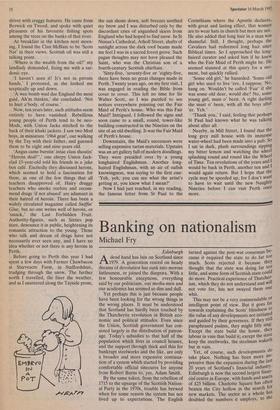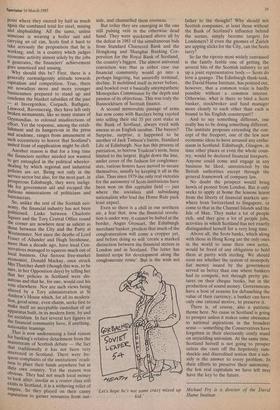Banking on nationalism
Michael Fry
Edinburgh Adead hand has lain on Scotland since 1979. A generation reared on heady dreams of devolution has sunk into morose listlessness, or joined the diaspora. With a few honourable exceptions, everything said by our politicians, our media-men and our academics has seemed so dim and dull.
Yet perhaps this is just because people have been looking for the wrong things in the wrong places. It must be understood that Scotland has hardly been touched by the Thatcherite revolution in British eco- nomic and political attitudes. Even since the Union, Scottish government has con- sisted largely in the distribution of patron- age. Today's subsidies to that half of the population which lives in council houses, and the support through thick and thin for bankrupt steelworks and the like, are only a broader and more expensive continua- tion of a system which started by providing comfortable official sinecures for anyone from Robert Burns to, yes, Adam Smith.
By the same token, from the rebellion of 1715 to the upsurge of the Scottish Nation- al Party in the 1970s, trouble has brewed when for some reason the system has not lived up to expectations. The English
turned against the post-war consensus be- cause it required the state to do far too much. Scots rejected it because they thought that the state was doing far too little, and some form of Scottish state could do more. Practical experience of Thatcher -
ism, which they do not understand and will not vote for, has not swayed them one whit.
This may not be a very commendable or intelligent point of view. But it goes far towards explaining the Scots' blindness to the value of any developments not initiated and guided by their governors. If they still paraphrased psalms, they might fitly sing: Except the state build the house, they labour in vain that build it; except the state keep the steelworks, the steelman waketh but in vain.
Yet, of course, such developments .do take place. Nothing has been more Im- pressive than the expansion during the last 20 years of Scotland's financial industry. Edinburgh is now the second largest finan- cial centre in Europe, with funds and assets of £25 billion. Charlotte Square has often beaten the City hollow in the search for new markets. The sector as a whole has doubled the numbers it employs, to the Point where they exceed by half as much again the combined total for steel, mining and shipbuilding. All the same, unless someone is wearing a boiler suit and carrying an oil can, Scots find it hard to take seriously the proposition that he is working; and, in a country which judges economic activity almost solely by the jobs it generates, the financiers' achievement goes unnoticed and unsung.
Why should this be? First, there is a generally curmudgeonly attitude towards capitalism and competition. True, there are nowadays more and more younger businessmen prepared to stand up and condemn the blanket subsidies of the past — at Invergordon, Corpach, Bathgate, Linwood, Ravenscraig, they have left only broken monuments, like so many statues of Ozymandias, to colossal misdirections of effort. Yet the response, among the estab- lishment and its hangers-on in the press and academe, ranges from amusement at such eccentricity to horror that Scotland's united front of supplication might be cleft.
Another reason is that for a long time the financiers neither needed nor wanted to get entangled in the political wheeler- dealing by which regional and industrial Policies are set. Being not only in the Service sector but also, for the most part, in prosperous Edinburgh, they were ineligi- ble for government aid and escaped the dubious ministrations of politicians and bureaucrats.
So, unlike the rest of the Scottish eco- nom- y, the financial industry has not been Politicised. Links between Charlotte Square and the Tory Central Office round the corner are nowhere near as salient as those between the City and the Party at Westminster. Not since the deaths of Lord Fraser of Allander and Hugh Stenhouse, more than a decade ago, have local Con- servatives managed to squeeze much out of local business. Our fiercest free-market economist, Donald Mackay, once struck Mrs Thatcher dumb (though this was, to be sure, in her Opposition days) by telling her that her policies in Scotland were dis- astrous and that he, for one, would cast his vote elsewhere. Nor are such views being altered by a Tory administration at St Andrew's House which, for all its modera- tion, good sense, even charm, seeks first to make itself an acceptable custodian of an apparatus built, in its modern form, by and for socialism. In fact several key figures in the financial community have, if anything, nationalist leanings. That is now undermining a final reason for banking's relative detachment from the mainstream of Scottish debate — the fact that traditionally it has not been very interested in Scotland. There were fre- quent complaints of the institutions' readi- ness to place their funds anywhere but in their own country. Yet the reason was obvious. They had not much local money to look after: insofar as a rentier class still exists in Scotland, it is a withering relict of empire. So they played on their canny reputation to garner resources from out- side, and channelled them overseas.
But today they are emerging as the one still pulsing vein in the otherwise dead hand. They were quickened above all by the defeat in 1981 of the simultaneous bids from Standard Chartered Bank and the Hongkong and Shanghai Banking Cor- poration for the Royal Bank of Scotland, the country's biggest. The almost universal conviction was that in either case our financial community would, go into a perhaps lingering, but assuredly terminal, decline. It mobilised itself as never before, and bowled over a basically unsympathetic Monopolies Commission by the depth and passion of its objections. This was truly the Bannockburn of Scottish finance.
A second memorable passage of arms has now come with Barclays being cajoled into selling their old 35 per cent stake in the Bank of Scotland, always eyed with unease as an English incubus. The buyers? Surprise, surprise, it happened to be another of Jack Tamson's bairns, Standard Life of Edinburgh. Nor has this process of patriation, to borrow Trudeau's term, been limited to the largest. Right down the line, under cover of the fashion for conglomer- ates, various houses have moved to secure themselves, usually by keeping it all in the clan. Thus since 1979 the only real victories for the autonomy of Scots institutions have been won on this capitalist field — just where the socialists and subsidising nationalists who lead the Home Rule pack least expect.
Even so there is a chill in our northern air, a fear that, now the financial revolu- tion is under way, it cannot be halted at the border. Angus Grossart, the Edinburgh merchant banker, predicts that much of the conglomeration will come a cropper yet, and before doing so will 'create a marked distinction between the financial sectors in London and in Scotland. The latter has limited scope for development along the conglomerate route'. But is the wish not kid.' Hume Institute. father to the thought? Why should not Scottish companies, at least those without the Bank of Scotland's influence behind the scenes, simply become targets for Londoners? If even the gnomes of Zurich are upping sticks for the City, can the Scots tarry?
So far the riposte most widely canvassed is the faintly feeble one of getting the several bits of the Scottish industry to set up a joint representative body — Scots do love a quango. The Edinburgh think-tank, the David Hume Institute, has pointed out, however, that a common voice is hardly possible without a common interest. Otherwise, what is there to bind a Scots banker, stockbroker and fund manager more closely to each other than each is bound to his English counterpart?
And to say something different, one really has to be doing something different. The institute proposes extending the con- cept of the freeport, one of the few new economic ideas to have aroused any enthu- siasm in Scotland. Edinburgh, Glasgow, in time other places or even the whole coun- try, would be declared financial freeports. Anyone could come and engage in any business he liked, unrestricted by the British authorities except through the general framework of company law.
No doubt the prospect would bring howls of protest from London. But it only seeks to apply at home the lessons learnt from the liberty of financial markets any- where from Switzerland to Singapore, or come to that in the Channel Islands and the Isle of Man. They make a lot of people rich, and they give a lot of people jobs, activities in which Scotland has not exactly distinguished herself for a very long time.
Above all, the Scots banks, which along with those in Hong Kong are the only ones in the world to issue their own notes, would be freed of any obligation to hold them at parity with sterling. We should soon see whether the system of monopoly fiat money issued by the government served us better than one where bankers had to compete, not through pretty pic- tures on their cheque books, but in the production of sound money. Governments have, a host of reasons for debauching the value of their currency; a banker can have only one rational motive, to preserve it.
There is, of course, also a patriotic theme here. No cause in Scotland is going to prosper unless it makes some obeisance to national aspirations in the broadest sense — something the Conservatives have forgotten in their electorally costly stand on unyielding unionism. At the same time, Scotland herself is not going to prosper unless she casts off the hopelessly ram- shackle and discredited notion that a sub- sidy is the answer to every problem. In their efforts to preserve their autonomy, the few real capitalists we have left may have the key to the future.
'Let's hope he's not some crazy mixed up Michael Fry is a director of the David



















































 Previous page
Previous page